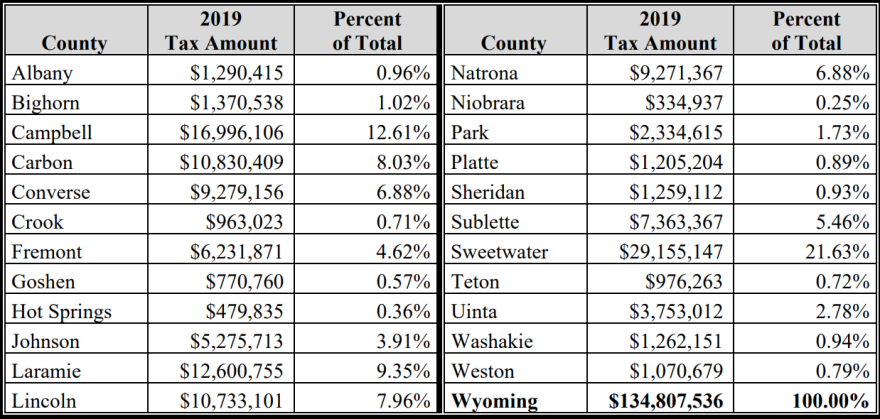Hours into a meeting of the Select Committee on Coal/Mineral Bankruptcies, Chairman Eric Barlow brought up a draft bill called "Protested Tax Payments." With little pause, Barlow welcomed in the day's regular testifiers.
"Come on up Johnson and Campbell County," Barlow said.
"Mr. Chairman, we would like to make an amendment," said Bill Novotny, Johnson County Commissioner, to a collective laugh.
This was the fourth bill of the day focused on solving issues with ad valorem taxes- the county version of severance taxes paid by mineral companies.
It's a critical tax for counties that helps to pay for local services in addition to state education. But calculations from the Powder River Basin Resource Council and the Legislative Service Office found counties across the state have missed out on $97,734,454 over the last 10 years.
Data shows it's recently gotten worse. Over the same time period, producers in Wyoming have become increasingly delinquent with total unpaid taxes rising by 4,500 percent.
So, county commissioners from Johnson and Campbell Counties got up and testified that it hasn't been easy to miss these funds.
"I can tell you it's difficult to budget with money you don't receive. Back 10 years, most taxes were paid. That is going away. When we get 2019's numbers, they're going to be earth-moving," Rusty Bell, chairman of the Campbell County Commission, said, referencing the Cloud Peak and Blackjewel bankruptcies.
In the day's discussion, five potential bills were proposed that each took a separate perspective at solving challenges around ad valorem tax: how to pay for pursuing missed taxes, whether the state should get involved, and, mostly, how to reduce delinquency.
The State
The first point of discussion was about the state and if it should get involved in a county's pursuit of missed ad valorem taxes.
In a letter, James Kaste, deputy attorney general of the Water and Natural Resources Division, explained his office does not have the authority to get involved.
"The Attorney General is not ordinarily authorized to represent counties in civil cases, including bankruptcy proceedings. That responsibility is generally vested in the various county attorneys," Kaste wrote.
Campbell and Johnson County commissioners said the counties are fighting for their own funds, but they could use a hand.

"It doesn't feel like the Attorney General's office has the back of the counties. We are prepared to pay our fair share of legal expenses, but when you get into these bankruptcies, we're shelling out hundreds of thousands of dollars to a bankruptcy attorney when in fact the AG's office should be at the table with us fighting," said Bill Novotny, chairman of the Johnson County Commission.
Campbell County Commissioner Rusty Bell added about three quarters of ad valorem taxes collected in his county go to state education funds.
While the topic was raised in the morning, Laramie Representative Cathy Connolly encouraged the committee to vote and draft a bill to give the state authority to get involved in bankruptcy situations. The committee agreed.
A Monthly Schedule
The biggest discussion of the day surrounded a long-considered solution to minimize ad valorem tax delinquency: shifting from an 18-month collection schedule to a monthly one. Right now, if a company pulls oil from the ground, it wouldn't need to pay a county tax on it for a year and a half.
"Most of those issues that need solving really happened because we give somebody 18 to 24 months to pay in the rear, and there's so many things that can happen that they use that money for," said Rusty Bell.
His colleague from Johnson County, Bill Novotny spoke up passionately.
"We think we can create a framework on a monthly basis that is fair to industry and counties and taxpayers and the state of Wyoming. They've figured out how to game the system," he said. "Do not let this bill die because bureaucrats are afraid of working through the hard parts of this. We don't have any more chances to make this right."
After much more discussion, Pete Obermueller, president of the Petroleum Association of Wyoming, said the committee is doing the right thing in making sure Wyoming is best prepared for further bankruptcies.
He added the oil and gas industry pays billions in taxes to the state and is delinquent on only about 1 percent of that. Obermueller added there are a lot of factors that weigh into the continued success of the industry including regulation.
"To the extent that Wyoming's government can avoid harming that economic calculus, that's better for Wyoming. It means more production, it means more jobs," he said.
As far as coming up with a monthly schedule that works, Obermueller he recommended an incentive to the industry to make it more palatable.
By the discussion's end, Committee Chairman Eric Barlow decided to put together a new group of diverse stakeholders and redraft a bill to better reflect the nuances raised in testimony. He said a new bill would be ready for discussion by the committee's next meeting in January.
Other Issues
Lawmakers will continue to discuss one bill that would prohibit a transfer of a company with outstanding taxes. That's a problem as debt-ridden companies sell off and leave the state. Another bill they'll consider in the future seeks to improve the counties' debt collection position in the bankruptcy process.
"We want to be friends of industry. They are our neighbors, our taxpayers. But we can't let them allow to continue to kick the can down the road," said Bill Novotny.
Have a question about this story? Contact the reporter, Cooper McKim, at cmckim5@uwyo.edu.









